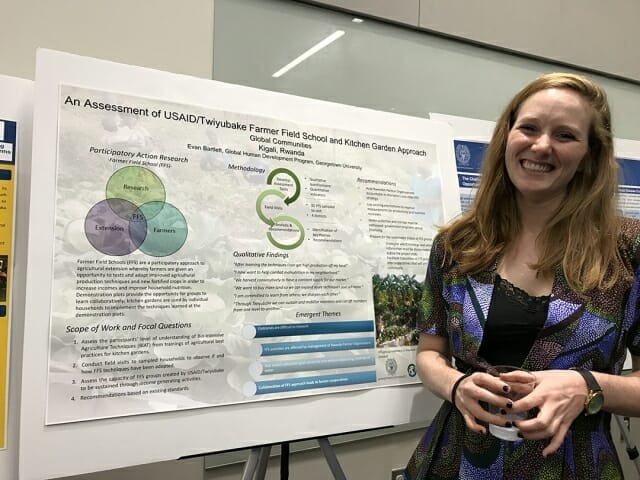News > Blog
VIP: Evan Bartlett, Using Participatory Approaches in Agriculture: Farmer Field Schools and Kitchen Gardens
Published 02/06/2018 by Global Communities

VIP Evan Bartlett: Using Participatory Approaches in Agriculture: Farmer Field Schools and Kitchen Gardens
Rwanda, 29 May-28 July 2017
Farmer Field Schools (FFSs) are a participatory approach to agricultural extension whereby farmers are given an opportunity to test and adopt improved agricultural production techniques and new fortified crops in order to increase incomes and improve household nutrition. The FFS approach is aligned with the Rwandan National Food and Nutrition Policy. The Global Communities USAID/Twiyubake program uses the Farmer Field School Approach in order to promote Bio-Intensive Agricultural Techniques (BIAT) that are meant to increase yields–increasing income and improving household nutrition.
Evan Bartlett, Master Candidate at Georgetown University’s Global Human Development (GHD) program, spent nine weeks in Rwanda in the summer of 2017 with the goal to ascertain whether beneficiaries were actually adopting improved agriculture techniques at home, evaluate why or why not, and make a recommendation for better implementation of Global Communities’ FFS and Kitchen Gardens approach.
With a local Global Communities staffer, Evan conducted 31 field visits to sampled households across four Rwandan districts. On a personal level, Evan quickly learned the limitations of using advanced technology while “standing ankle deep in cabbage” and that qualitative, and even quantitative analyses, have to be flexible. “I realized some of my questions were terrible, so I stopped asking them. And I realized there were some valuable questions that I wasn’t even asking, so I added them,” she recalls. After completing her field visits, Evan proceeded to analyze the data.
What she heard from beneficiaries included statements like: “We harvest consequentially to have a consistent supply for our market,” “We want to buy more land so we can expand more techniques and sell more,” and “I now want to combat malnutrition in my neighborhood.” These statements suggested a well-rooted interest in the FFS approach and even a broader interest in impacting long-term sustainability and income generation. Evan’s specific findings and recommendations related to two important implementation issues: 1) holding local Rwandan partners accountable to work plans and other FFS strategies to improve overall performance and 2) focusing on water. Evan says, “Water collection and storage issues must be addressed because the year-round cultivation goal cannot be met without addressing this challenge.”




